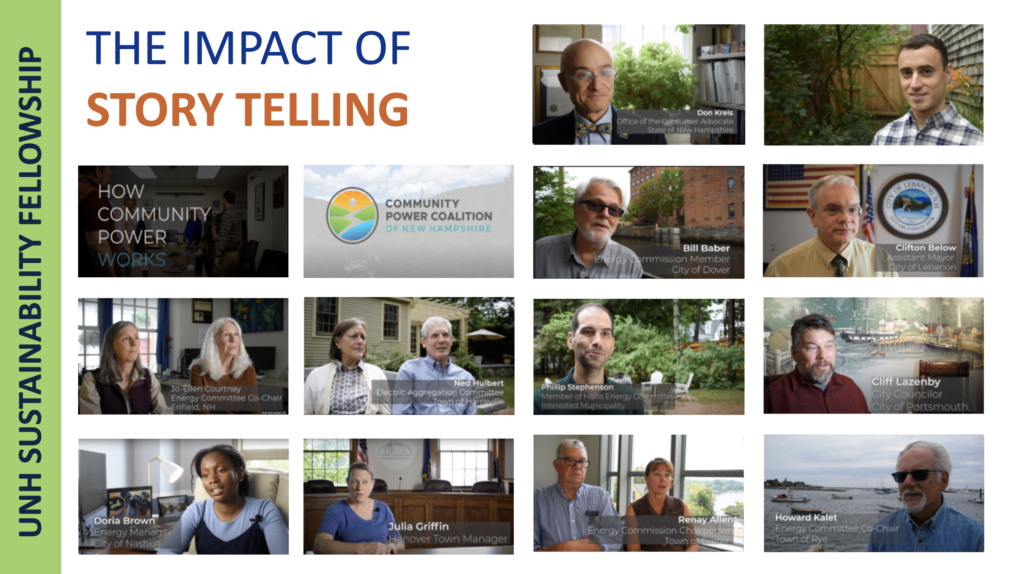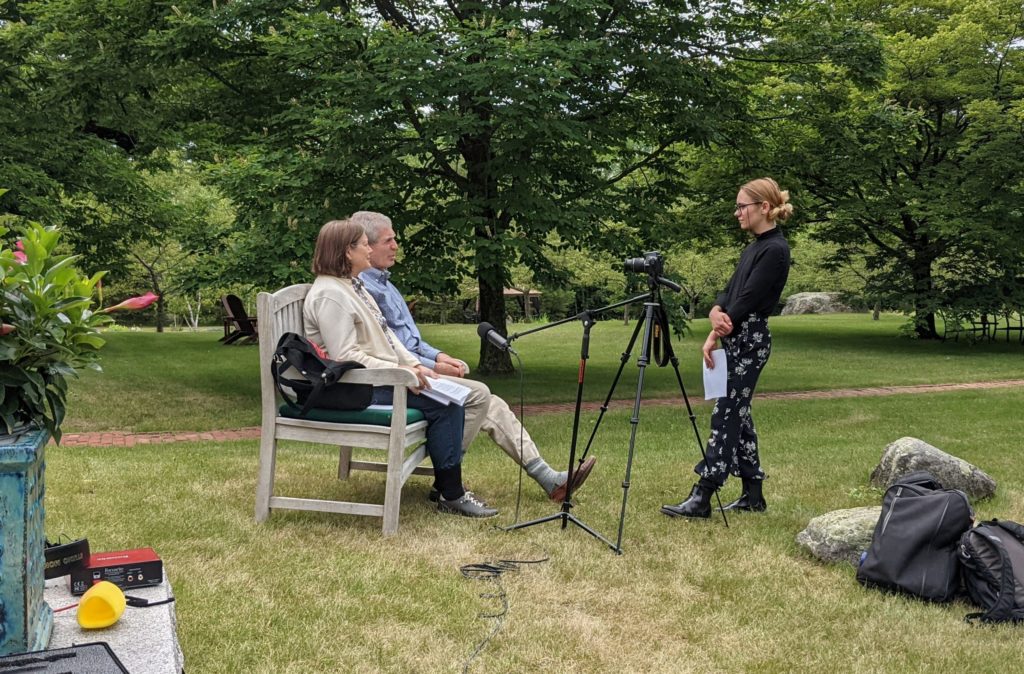Every summer the University of New Hampshire Sustainability Institute (UNHSI) hosts a cohort of both graduate and undergraduate Sustainability Fellows. Fellows are paired with municipal, educational, corporate, and non-profit partners in New England to work on transformative sustainability initiatives. The summer projects are designed to create an immediate impact, offer an extraordinary learning experience, and foster meaningful collaboration. Fellows are supported by their partner organization, mentors from UNH, the rest of their cohort, and alumni of the program. This past summer, three second-year UEP students—Cassandra Bull, Kameice Francis, and Maggie Peard—were awarded with Fellowship positions. Read on for their reflections on the experience.
What project did you work on this past summer as a UNH Sustainability Fellow?
Cassandra Bull: I worked for Community Power Coalition of New Hampshire as their Digital Content Creator and my summer project was to create a series of videos for my partner organization.
In short, community power means that communities can buy or sell their own electricity instead of the typical regulated monopolies like Unitil or Eversource. The purpose of my project specifically was to document and communicate inspiring stories of local leaders who are bringing community power to their cities and towns.
This summer, I traveled throughout New Hampshire in my converted cargo van and interviewed stakeholders about their interest in the community power movement. The end result of this fellowship can be found in 13 video deliverables totaling just under an hour of digital content. Among them, there is a “What is community power?” video, a “Why community power” video, an interview with the NH Consumer Advocate Don Kreis, and ten “Who?” videos with interviews of local leaders in each municipality. The videos range from 1.5 minutes to 13 minutes in length.

Kameice Francis: This summer, I worked with the Burlington Electric Department (BED), an electric utility in Burlington, Vermont. During my Fellowship, I developed guidance for multifamily property owners to help them navigate electric vehicle charging and to provide them with information on available incentive programs. I also assisted in the expansion of an electric vehicle incentive program for multifamily property owners. This included interviewing stakeholders, such as multifamily property owners and representatives from other utilities, to figure out what to add to the installation guide and how to improve the pilot program; creating cost estimates for various charging scenarios; and researching electric vehicle charger types and different installation processes.
Maggie Peard: My fellowship paired me with the Southern Maine Planning and Development Commission (SMPDC) where I worked on innovative engagement strategies for a regional coastal resilience plan. My work was part of an ongoing planning project to advance coastal resiliency in the 10 southernmost coastal towns in Maine. My summer project included summarizing the results of an initial project survey; interviewing project stakeholders about their concerns, frustrations, and hopes as they relate to coastal resilience; exploring web engagement platform options; and researching coastal resilience best practices.
What experiences, either at UEP or elsewhere, helped prepare you for your work as a Sustainability Fellow?
CB: My undergraduate degree in fine arts certainly prepared me for this experience. I am always happy to combine my skills in design and video with my passion for sustainability. The two years of video that I took helped prepare me to understand Premiere software. I have also made videos for community organizations since undergraduate school and had practice in storytelling through this medium. The project management lessons that were taught in Field Projects also helped me create a project scope of work and timeline that worked seamlessly. Never have I embarked on a project that stayed on course over its entire duration and I attribute this success to Field Projects.

KF: I think my previous internship experiences definitely helped me to prepare for my work this summer. For example, I was the Electric Vehicle Intern for the Office of Sustainability and Environment for the city of Somerville. In this role, I developed guidance for renters and property owners to help them understand their options for charging electric vehicles in multifamily dwellings. This was done after conducting extensive research focused on the installation of electric vehicle infrastructure in Somerville, Massachusetts. This work was pretty similar to the work I did this summer and I think it helped me to approach my summer project more efficiently.
MP: Both my Field Project and my previous work on community engagement for climate action planning processes prepared me well for the fellowship—especially conducting and summarizing stakeholder interviews. Consolidating 20 conversations into a single summary document that accurately presents the key takeaways can be challenging, but spending time talking through the best ways to go about that with my Field Project team members last semester made this summer experience much smoother. The discussions we had about Home Rule and Dillon Rule states in Cities in Space, Place, and Time—another required course in the MA program—also provided excellent context for understanding the nuances and challenges of working on a plan for multiple municipalities in a Home Rule state like Maine.
What elements of the work were the most rewarding? Why?
CB: It is rewarding to feel like I created something useful and concrete for my host organization. The impact of my work is multifold: the coalition will use the videos to help interested municipalities learn more about community power. The individual stories and testimonies of coalition members will help put a face to the name and convey—on a more human level—why this work is important in New Hampshire.
Another secondary impact that I see living on through this work is that municipalities that are interested in adopting community power can turn around and use my work as personal educational material for their constituents, or “ratepayers,” as we call them in the industry.
KF: I enjoyed being able to place equity at the forefront of my work. Oftentimes, clean transportation options are seen as inaccessible, especially because of the associated costs. Ensuring the expansion of the pilot incentive program focused on incorporating equity was a first step towards giving more people access to cleaner modes of transportation. I appreciated the opportunity to contribute to this process. I also appreciated that I was able to connect with so many people. This helped me to feel very connected to my work during the Fellowship, despite the fact that I was working remotely. It also made it possible for me to see the direct impact of the work that I was doing. My Primary Mentor and I created the diagram below to show just how many people and organizations I spoke to and/or collected data from over the course of the summer.
MP: I really appreciated the opportunity to advocate for a more equitable planning process. Part of my role was to review and suggest improvements for the ongoing stakeholder engagement strategy. I made suggestions to expand the set of project stakeholders beyond the “usual suspects” to include youth, business owners, indigenous leaders, and others. While it was slightly out of the scope of my project, I was able to propose a youth focus group to gather additional feedback and gave a presentation to SMPDC about steps they could take to make all of their planning processes more equitable.
Any takeaways from the Fellowship that might inform your second year at UEP, your thesis, or your career?
CB: The Community Power Coalition organizes municipalities to create a single entity. The members then come together for peer to peer learning, to share administrative costs, to carry more lobbying power, and to get cheaper rates by combining their market share. I am interested in a career path that is at the intersection of multiple levels, from the grassroots to a national scale. The Coalition hosts conversations that feel large and impactful, but also remain genuine because its work is controlled by boots-on-the-ground stakeholders.
KF: This Fellowship has cemented my interest in working in either transportation or energy (or finding a way to combine both of these fields). I have always been interested in these fields but my work this summer has further shown me that I’d like to continue working in them. My thesis topic is focused on transportation and I will be using what I learned from my Fellowship to guide my research, such as by ensuring that equity is placed at the forefront of my work.
MP: The fellowship reinforced my desire to continue working on climate action and resilience planning. Hearing about the effects of sea level rise in Maine (and seeing them firsthand) further demonstrated the urgency of this work. In my last year at UEP, I want to focus on developing skills and knowledge that can be directly applied to advancing climate mitigation and adaptation. While I am still developing my thesis topic, I am eager to find something that not only equips me with those skills and knowledge, but also advances climate resilience (at least at some level!).